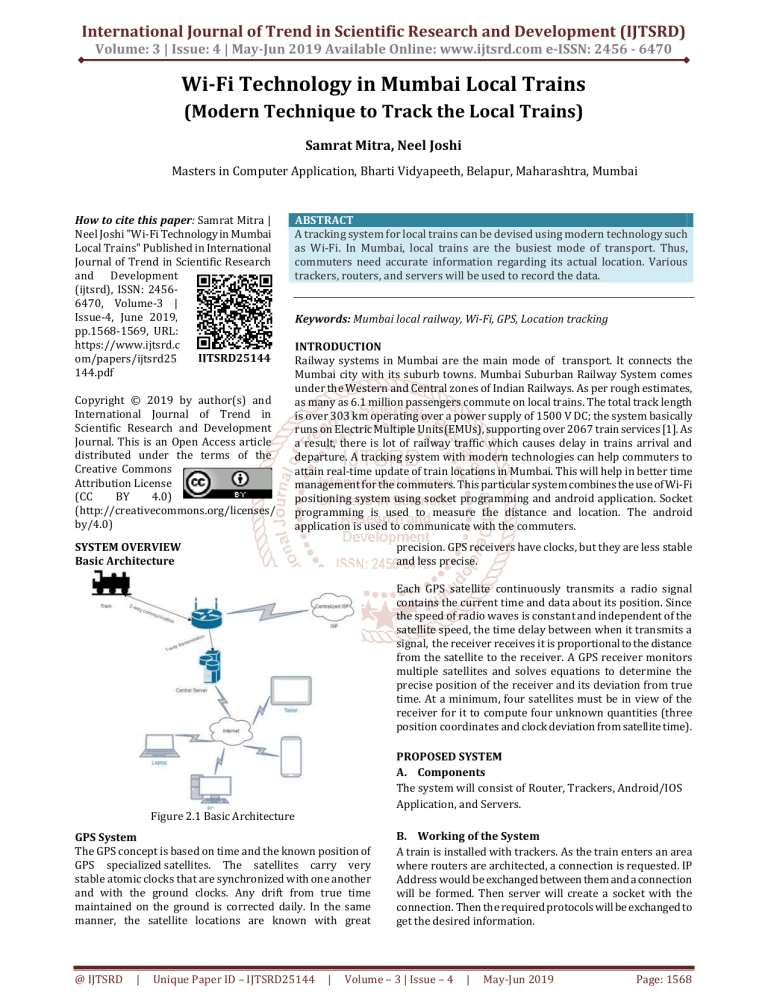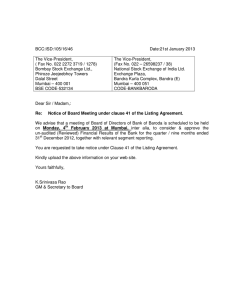
International Journal of Trend in Scientific Research and Development (IJTSRD) Volume: 3 | Issue: 4 | May-Jun 2019 Available Online: www.ijtsrd.com e-ISSN: 2456 - 6470 Wi-Fi Technology in Mumbai Local Trains (Modern Technique to Track the Local Trains) Samrat Mitra, Neel Joshi Masters in Computer Application, Bharti Vidyapeeth, Belapur, Maharashtra, Mumbai How to cite this paper: Samrat Mitra | Neel Joshi "Wi-Fi Technology in Mumbai Local Trains" Published in International Journal of Trend in Scientific Research and Development (ijtsrd), ISSN: 24566470, Volume-3 | Issue-4, June 2019, pp.1568-1569, URL: https://www.ijtsrd.c IJTSRD25144 om/papers/ijtsrd25 144.pdf Copyright © 2019 by author(s) and International Journal of Trend in Scientific Research and Development Journal. This is an Open Access article distributed under the terms of the Creative Commons Attribution License (CC BY 4.0) (http://creativecommons.org/licenses/ by/4.0) ABSTRACT A tracking system for local trains can be devised using modern technology such as Wi-Fi. In Mumbai, local trains are the busiest mode of transport. Thus, commuters need accurate information regarding its actual location. Various trackers, routers, and servers will be used to record the data. Keywords: Mumbai local railway, Wi-Fi, GPS, Location tracking INTRODUCTION Railway systems in Mumbai are the main mode of transport. It connects the Mumbai city with its suburb towns. Mumbai Suburban Railway System comes under the Western and Central zones of Indian Railways. As per rough estimates, as many as 6.1 million passengers commute on local trains. The total track length is over 303 km operating over a power supply of 1500 V DC; the system basically runs on Electric Multiple Units(EMUs), supporting over 2067 train services [1]. As a result, there is lot of railway traffic which causes delay in trains arrival and departure. A tracking system with modern technologies can help commuters to attain real-time update of train locations in Mumbai. This will help in better time management for the commuters. This particular system combines the use of Wi-Fi positioning system using socket programming and android application. Socket programming is used to measure the distance and location. The android application is used to communicate with the commuters. SYSTEM OVERVIEW Basic Architecture precision. GPS receivers have clocks, but they are less stable and less precise. Each GPS satellite continuously transmits a radio signal contains the current time and data about its position. Since the speed of radio waves is constant and independent of the satellite speed, the time delay between when it transmits a signal, the receiver receives it is proportional to the distance from the satellite to the receiver. A GPS receiver monitors multiple satellites and solves equations to determine the precise position of the receiver and its deviation from true time. At a minimum, four satellites must be in view of the receiver for it to compute four unknown quantities (three position coordinates and clock deviation from satellite time). PROPOSED SYSTEM A. Components The system will consist of Router, Trackers, Android/IOS Application, and Servers. Figure 2.1 Basic Architecture GPS System The GPS concept is based on time and the known position of GPS specialized satellites. The satellites carry very stable atomic clocks that are synchronized with one another and with the ground clocks. Any drift from true time maintained on the ground is corrected daily. In the same manner, the satellite locations are known with great @ IJTSRD | Unique Paper ID – IJTSRD25144 | B. Working of the System A train is installed with trackers. As the train enters an area where routers are architected, a connection is requested. IP Address would be exchanged between them and a connection will be formed. Then server will create a socket with the connection. Then the required protocols will be exchanged to get the desired information. Volume – 3 | Issue – 4 | May-Jun 2019 Page: 1568 International Journal of Trend in Scientific Research and Development (IJTSRD) @ www.ijtsrd.com eISSN: 2456-6470 1. At the Server side After completion of some protocols, server will run the code to gather the real time location of the train. These data will then passed on the android app. Figure 3.1 Flowchart of Client Code FUTURE ENHANCEMENTS New features can be added such as 1. Lodge official complaints regarding local railways 2. Calling emergency number of Mumbai railway. 3. User interaction. 4. A virtual map of the entire Mumbai local railways. Figure 3.1 Flowchart of Server Code i. At the Client side(Application) An HTTP Connection would be established and the data from server will be received. The users can logged in to the app and can fetch the required information related to the train. CONCLUSIONS In olden days people had to wait for hours in the railway stations to know about timing of the train. Whether the train is running on time or delayed. These Modern Train Tracking System will allow people to know about the Real-Time location of the trains. These days, people don’t have hours to waste sitting idle in the stations. This tracking system can save lots of time of commuters. The basic requirement would be smart phone and the app need to be installed in it. This system uses Wi-Fi network, and nowadays it is easily accessible in Mumbai. It will provide us with better accuracy. REFERENCES [1] Mumbai Local Railway, https://erail.in/blog/suburban-rail-service-in-majorcities-of-india/58 [2] Mumbai Local Railway, http://www.bharatonline.com/maharashtra/travel/m umbai/local-trains.html [3] Global Positioning System, https://www.ja-gps.com.au/what-is-gps.aspx @ IJTSRD | Unique Paper ID – IJTSRD25144 | Volume – 3 | Issue – 4 | May-Jun 2019 Page: 1569


